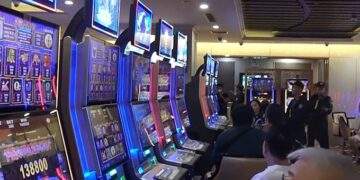In the 1990s Hanoi’s Chau Long Market was a chaotic symphony of the odors of fish and meat and stagnant water, the sharp clatter of knives on cutting boards and the hurried rumble of delivery carts, Quang, 45, recalls.
“Hey, kid!” was how Quang, who was 12 years old at the time, would be summoned, and he would instantly spring up from a corner to assist the business owner who called because they needed tables wiped or cutting boards cleaned in return for a loaf of bread or an equivalence in cash.
 |
|
Nguyen Quang Quang (R) in a party for sponsors of Koto in 2023. Photo courtesy of Nguyen Quang Quang |
Quang was not a Hanoi local but from an impoverished province nearby. He saw his parents toil daily to make ends meet but still could not prevent him and his siblings from going to bed hungry.
He decided to drop out of school and headed to the city in the hope of finding some work.
But his scrawny frame and immature face deterred employers. After days of starvation, he drifted to Chau Long in the city’s downtown, doing whatever odd jobs he could do to survive.
Gradually he became a familiar face, hired to scrub tables by pork vendors or pluck chickens and ducks.
Day after day his hands, soaked in filthy water, became blistered and infected and the sores ate into his bones. On many nights he would grit his teeth and soak his hands in alum water to ease the pain.
Exhausted from the grueling work, he would slump wherever in the market was shielded from sun and rain.
“Life in the countryside was just as hard, but at least I had my parents,” he recalls.
After nearly three years as a homeless person in the market, a vendor took him in as a household helper.
When not doing chores, Quang took on extra work at nearby shops to earn a little on the side to send home to his family.
A pivotal moment came when he was 19.
The vendor’s younger brother asked him “What’s your dream?” and Quang’s mind flashed to the image of hotel staff near the market – polished in crisp uniforms, courteously greeting foreign guests and opening the doors to a luxurious, perfumed lobby.
He dreamed of working in a hotel.
Dreams do come true; they did at least for Quang when he eventually found Koto, Vietnam’s first social enterprise, which trains disadvantaged youth in hospitality.
The company’s founder Jimmy Pham still remembers Quang during his interview in 2000. Everyone in the room had tears when they listened to the story of the young boy, who told it with an innocent smile.
“Do you know why you have been chosen for the program?” Jimmy asked after the interview concluded. “Because you smile a lot.”
The smiles did help Quang as he trained to be a waiter, which he found easy. Learning English was, however, a bit of a struggle. His room was filled with English notes as he sang along to English songs on a cassette player without understanding all the words.
At the end of his first month at the facility he was called up to collect his salary, a VND500,000 (US$19) pay donated by sponsors.
“I could not hold back the tears as I held the cash. For the first time in seven years of scraping by in the market, I earned a real wage.”
Graduating from the program in 2002, Quang followed Jimmy’s advice to “experience many places to go far,” working six months at a time at different establishments, including premium hotels such as Metropole and Sheraton.
But his dream had expanded by then: He wanted to be more than just a hotel employee.
His two experimental years ended with him starting a business with two friends.
They opened a pub decorated with bamboo and cement with a Hawaiian tribal vibe at Mui Ne Beach in central Vietnam.
As the beach was filled with German and Russian tourists, Quang’s experience serving foreigners at hotel bars helped him zero in on a perfect strategy to attract customers.
“Instead of loud electronics music, I chose rock, pop, and hip-hop—perfect for cocktails,” he says.
Within two months their pub became the hottest spot in town.
He opened a bar in downtown Hanoi five years later, targeting foreign tourists and young Vietnamese.
 |
|
Nguyen Quang Quang (L) and his wife during a trip in 2024. Photo courtesy of Nguyen Quang Quang |
Over the next eight years he expanded to multiple locations across tourist hubs, creating vibrant, music-driven venues featuring local and international DJs.
When Covid-19 hit Quang’s chain of bars and hotels teetered. By then he was in his 40s.
“I went back to researching, seeking new strategies to adapt to the pandemic and economic downturn.”
Leveraging his wide network and diverse customer base, he revived his businesses. He now owns 22 entertainment venues nationwide besides the 13 hotels.
Despite his busy schedule the former Koto trainee returns to his alma mater several times a year as sponsor and mentor, inspiring the next generation.
Many Koto alumni now work in his businesses, and some have achieved their own success under his guidance.
“The livelihoods Quang has created, the families he has supported, and the futures he has shaped are a testament to a life built on integrity, compassion and purpose,” Jimmy says.
For Quang, success boils down to two words: “hard work and resilience.”
“Those seven years in the market’s shadows taught me grit. They showed me how to keep life in balance.”





